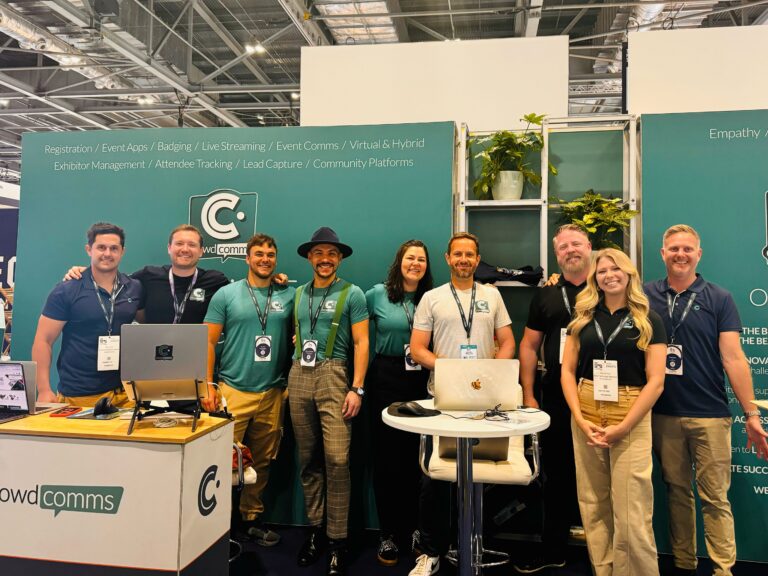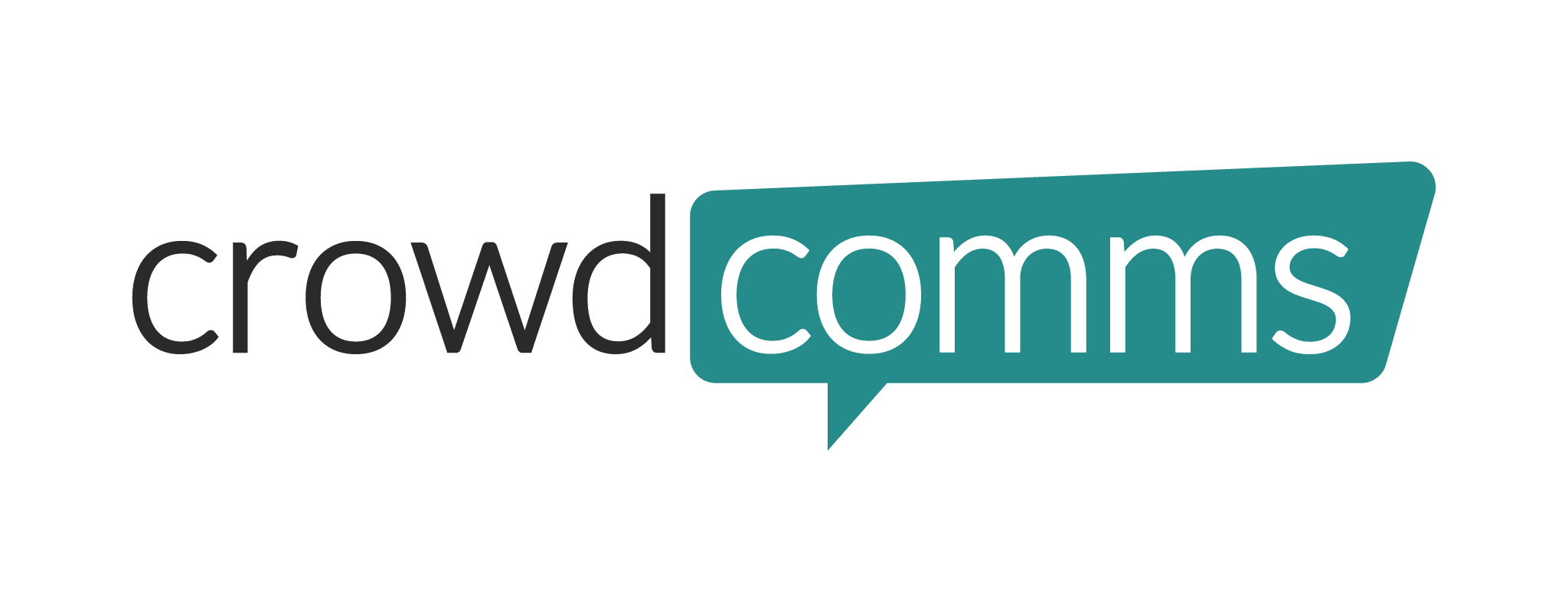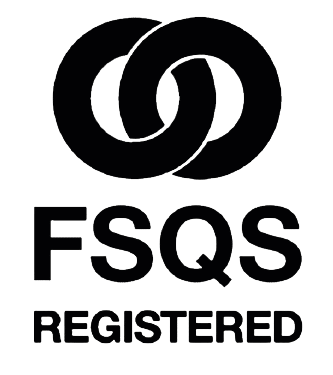Whether you’re a budding event planner, potential sponsor, or future attendee – you’ll know there’s a range of event types that bring people together. But what you may not know is how a trade show differs from an industry event? Or what happens exactly at an AGM, and is it different to a Town Hall Meeting?
If you’re curious about what makes an event an industry event, or who you might meet at an AGM, read on to learn more about the four essential event types.
Trade Shows: Marketplaces for Industry

Trade shows are dynamic events that serve as bustling marketplaces for industries to showcase their latest products, services, and innovations. They very much have a sales focus, with the show acting as an effective route to market for many partners, producers and suppliers.
From luxury cars to futuristic software, trade shows give attendees the opportunity to see and hear new products in action. They can ask manufacturers and developers questions, see demonstrations, and network with like-minded attendees.
What Will I Find at a Trade Show?
Typical features include:
- Booths and displays: Companies set up visually striking booths to display their offerings. They may look to collect leads from potential customers and clients.
- Networking Opportunities: Attendees are likely to share similar passions and interests. Whether someone wants to establish a new working connection or forge a friendship, trade shows can be great for networking.
- Product Launches: Ideal for showcasing new products and services, trade shows give suppliers a unique opportunity to launch their exciting new [insert awesome thing here] to an enthusiastic and captive audience.
- Educational Sessions: Complementing the sales element are workshops and seminars that provide insights into industry trends and challenges or take a more in-depth look at specific products.
Why do People Attend Trade Shows?
- Business Expansion: Attendees may be looking for opportunities for business growth, collaborations, and partnerships.
- Sales Opportunities: Related businesses may purchase a show booth, or take on event sponsorship, as a way to reach new customers and/or reinforce relationships with existing ones.
- Market Insights: With trade shows often giving people the first look at new innovations, they are popular with industry professionals who want to stay informed about emerging trends, technologies, and strategies.
- Relationship Building: Trade shows offer a unique platform to foster valuable connections with industry peers.
Who Can I Expect to Meet There?
- Entrepreneurs and business owners looking for new partnerships and collaborations.
- Sales and marketing professionals eager to connect with potential clients and generate leads.
- Industry experts and thought leaders sharing insights and expertise.
- Members of the public with a keen product or service interest (think boat/car/beauty/gaming shows)
Industry Events: Fostering Expertise and Facilitating Learning

While industry events and conferences can have a sales element, they tend to differ from a Trade Show by focusing on learning and education. Industry events mostly cover specific industries at a niche level within broader sectors (e.g., an anaesthetists’ conference within the medical sector).
This event type delves deep into specialised topics, offering participants a chance to gain in-depth knowledge, exchange ideas, and enhance their skills. Attending these events can be important for those who need access to the latest innovations, research, thinking, and trends in their industry.
What Will I Find at an Industry Event?
- Targeted Content: Sessions cover specialised subjects and provide comprehensive insights. They are often led by industry experts (see below) and may involve audience interaction via live polling or Q&A.
- Speaker Sessions: Renowned industry professionals share their experiences, research, and best practices. Speakers may form part of an expert panel or lead a session individually.
- Interactive discussions and networking: Networking is likely to be a significant feature of any industry event. Attendees participate in conversations online or in-person, and engage via designated networking spaces. These spaces may also accommodate break-out rooms and group collaborations.
- Skill Enhancement: Workshops allow attendees and delegates to develop practical expertise. This may be in the form of demonstrations or hands-on activities.
Why do People Attend Industry Events?
- Skill Development: Industry professionals aim to enhance their expertise and acquire practical insights. Industry events can often enable attendees to accrue valuable continuing professional development (CPD) points or other accreditations needed to maintain industry status (e.g., as a registered accountant).
- Knowledge Enrichment: It’s always useful to understand how a particular industry is evolving and what the future may bring. Industry events offer access to the latest research, trends, and innovations.
- Networking: A significant aspect of most industry events, networking is often a primary reason for people to attend. From collaborating with like-minded peers to finding new working partners, event networking can give people the opportunity to make career-changing connections.
Who Can I Expect to Meet There?
- Specialists and experts seeking to deepen their knowledge and gain a competitive edge.
- Researchers and academics sharing their latest findings and engaging in discussions.
- Enthusiasts who are passionate about a particular niche within the industry.
Town Halls: Delivering Transparency and Communicating Direction

Town halls are an internal event type hosted by organisations to communicate updates, share strategic goals, and engage employees. These gatherings promote transparency, align teams with the company’s vision, and provide a platform for open communication between leadership and staff.
They can be used to launch new product lines or to share key organisational changes. A key feature of town halls is the ability for the organisation’s people to pose questions to leadership teams.
What Will I Find at a Town Hall Meeting?
- Leadership Addresses: Key executives present company updates, vision, and objectives. This can be particularly important when significant change is occurring, and the organisation wants to ensure its people have access to accurate and timely information.
- Q&A Sessions: Employees have the opportunity to ask questions and voice concerns.
- Employee Recognition: Town halls are often used to celebrate success. Whether it’s overall organisational performance or the outstanding contributions and achievements of smaller groups and individuals, a town hall meeting is a great opportunity to recognise positive results.
- Interactive Elements: It’s not always easy to put your hand up and raise your voice in front of hundreds of peers! To encourage everyone to participate, town hall meetings will often include interactive technology (such as event apps) that support polls, surveys, and Q&A.
Why do People Attend Town Hall Meetings?
- It’s mandated!: Town hall meetings are often a mandated part of an organisation’s schedule. This ensures nobody misses key information or the opportunity to voice an opinion. For people who do miss a town hall (e.g., through sickness), organisations may choose to record the meeting so people can catch up or rewatch.
- Company Alignment: Town halls can give employees clarity on the company’s direction and understanding about why certain decisions have been made.
- Communication: Providing a forum for open dialogue and transparent communication is an important way of ensuring everyone has the right detail at the right time.
- Team Building: Interactive elements (such as live polling) can create a sense of camaraderie and shared goals.
Who Can I Expect to Meet at a Town Hall?
- Employees from various departments, levels, and functions within the organisation. For examples, the Sales and Marketing Director may be part of the town hall to introduce quarterly sales results.
- Executives and leaders sharing the company’s vision and engaging with staff.
- HR professionals facilitating the event and addressing employee concerns.
AGMS: A Glimpse into Corporate Dynamics

While is optional for organisations to run town hall meetings, an AGM is a legally mandated gathering of a company’s shareholders. The AGM provides them with the opportunity to review and discuss the company’s financial performance, elect board members, and address critical decisions.
Beyond the regulatory obligations, AGMs are an opportunity for transparency and to allow shareholders to engage directly with the company’s leadership in the form of polling or live Q&As.
What Will I Find at an AGM?
- Financial Review: An organisation’s CFO (or similar) will complete the presentation and discussion of the company’s financial statements, including revenue, expenses, and profits. They may cover mitigating factors (such as current economic climate, supply chain issues or buying trends) which have impacted results.
- Board Elections: Shareholders vote to elect or re-elect members of the board of directors. The vote may involve a simple show of hands or use of digital voting for large numbers of attendees (digital voting is also likely to be more accurate).
- CEO Address: The company’s CEO or top executive shares insights into the organisation’s strategic direction. The strategic direction will likely be in response to financial performance and market or industry trends.
- Q&A Sessions: Shareholders can ask questions about the company’s performance, strategies, and future plans. Much like the board member vote, Q&A sessions can involve hand-raising to ask a question or using digital platforms where shareholders can pose questions online in real-time. The latter is particularly useful if AGM organisers want to aggregate popular questions.
- Resolutions and Voting: Voting on proposed resolutions, such as mergers, acquisitions, or changes to company policies.
Why do People Attend an AGM?
- Information and Insight: Attendees have the opportunity to gain a comprehensive understanding of the company’s financial health, strategies, and challenges. Shareholders have a financial stake in the organisation’s success – an AGM can therefore give them assurances that their investment will yield a healthy return
- Shareholder Participation: AGMs empower shareholders to actively engage in corporate decision-making and express their opinions. Shareholders effectively ‘own’ organisations, and an AGM gives them the opportunity to influence the strategic direction or deliver feedback on past performance.
- Networking Opportunities: Like all the events we discuss in this piece, AGMs are a good place to network! Shareholders have the chance to connect with fellow investors, board members, and company executives.
Who Will I Meet at an AGM?
- Shareholders and Investors: Individuals who own shares in the company and have a vested interest in its performance and success.
- Board Members and Executives: Company leaders, including CEOs, CFOs, and board directors, who engage with shareholders and present key updates.
- Analysts and Advisors: Financial analysts, investment professionals, and legal advisors who offer insights into the company’s performance.
- Proxy Representatives: Individuals authorised to vote on behalf of absent shareholders.
- Activist Investors: Shareholders who may use the AGM platform to advocate for specific changes or strategies within the company.
In Summary
From business professionals looking to expand their networks to employees seeking transparency and alignment – these main event types deliver important benefits for a wide array of stakeholders.
For event organisers and attendees, each event type offers a different way to connect with groups of key individuals to share information, forge relationships and collaborate effectively.
Now you know about the different event types, find out the event tech needed to make each event a success.





